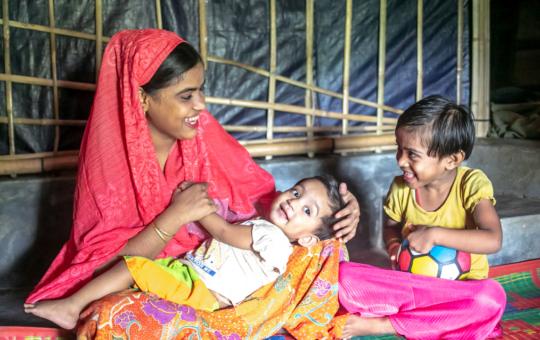News and resources
Supporting Young Children and Caregivers in Crisis: Bridging Gaps, Building Resilience for Future Generations.
I was delighted to join the Moving Minds Alliance as its Director at the end of October 2023. I had witnessed the Alliance’s evolution from its early days. In 2018, over lunch with Elvira Thiessen (from Van Leer Foundation) I heard about its impactful vision and mission to ensure that young children (and caregivers) affected by crisis and displacement can access the resources they need to receive nurturing care, to foster resilience and support optimal development. I was deeply inspired.
This cause resonates profoundly with me as my mother, born in 1939 in Germany, experienced repeated displacement as a child. She received no support to process the resulting traumas which profoundly affected her life. My dedication to supporting initiatives that address the challenges faced by today’s children in crisis led me to this role.
With 15 years’ experience in the international child rights space, I have had the opportunity to design early years programmes for children living in communities impacted by crisis. In my previous role as Director of Programmes at the Lumos Foundation, I oversaw the emergency response in Ukraine and Moldova, focusing in both contexts on issues affecting young children (including those with disabilities) and caregivers. Whilst Director of Child to Child, I partnered with local agency, the Pikin to Pikin Movement to implement a child participatory early learning initiative in Sierra Leone. In response to the West Africa Ebola crisis, the project was adapted into a participatory radio for education / communications initiative (Pikin to Pikin Tok) which incorporated a focus on life skills in response to the range of child protection issues impacting children, particularly girls. Child to Child also worked with a local partner in Karachi, the Teachers Resource Centre, to implement a similar participatory early learning initiative for young children in flood-affected communities in Sindh Province, which incorporated a focus on disaster risk reduction.
Throughout my career, I have been committed to working in partnership with local agencies, deeply rooted in local communities, as they bring a depth of contextual expertise and unique insights into the problems facing children and caregivers – as well as potential solutions. They are also there for the long-haul and are committed to contributing to long-term sustainable change. But they are rarely able to reach or directly influence those who make the decisions about which agencies or initiatives to fund and are often completely overlooked or are subjected to onerous due diligence or other requirements that they cannot manage. We must address and overcome these barriers and challenges in collaboration with local stakeholders. I look forward to building the Moving Minds Alliance in 2024 and beyond to ensure that we can amplify the voices and of those directly impacted by these issues. Their perspectives will help us to improve decision making and reimagine more effective ways of working to ensure that young children and caregivers affected by crisis can access the support that they need and deserve.
Working in partnership with local stakeholders in crisis-affected communities also made me realize that the needs and rights of young children and caregivers are not systematically prioritized within emergency response and that there are insufficient resources available. Projects intended to meet their needs are typically short-term and sector-siloed, prioritizing nutrition, protection or early learning. They are rarely designed to ensure provision of holistic and integrated packages of nurturing care for children – nor to provide the support required by caregivers to enable them to provide nurturing care.
The Moving Minds Alliance strives to address these gaps, as it brings together philanthropic donors, UN agencies, INGOs, regional ECD networks, agencies with expertise in trauma-informed response, academics, and more. As a multi-stakeholder alliance, it can leverage this diverse expertise to ensure holistic and integrated packages of nurturing care for children, prioritizing the needs and rights of young children and caregivers in crisis situations.
The need for such a focused initiative has never been greater: concerted action is urgently required. The reality for so many communities at the beginning of this new year is of continuing conflict, bombardment, and displacement, with children and caregivers disproportionately and devastatingly impacted. The numbers of people displaced globally has never been higher with forced displacement at its highest level since 1945. There were almost 110 million refugees, internally displaced and stateless people by the end of 2022. Disasters alone led to a record number of 32.6 million new internal displacements in 2022.
It is inevitable that the number and scale of these crises will continue to escalate. This role allows me to work collaboratively with members, mobilize our growing network to contribute to transformative change and advocate for sustained, comprehensive support for those vulnerable children, families and communities affected by crisis, conflict and displacement. None of the individual member agencies can achieve this alone. Only by creatively harnessing our collective resources, our unique and diverse range of experience and expertise, can we hope to make a significant impact. I feel honored to contribute to this mission.
This blog was authored by Tricia Young, Director, Moving Minds Alliance
 ©
©